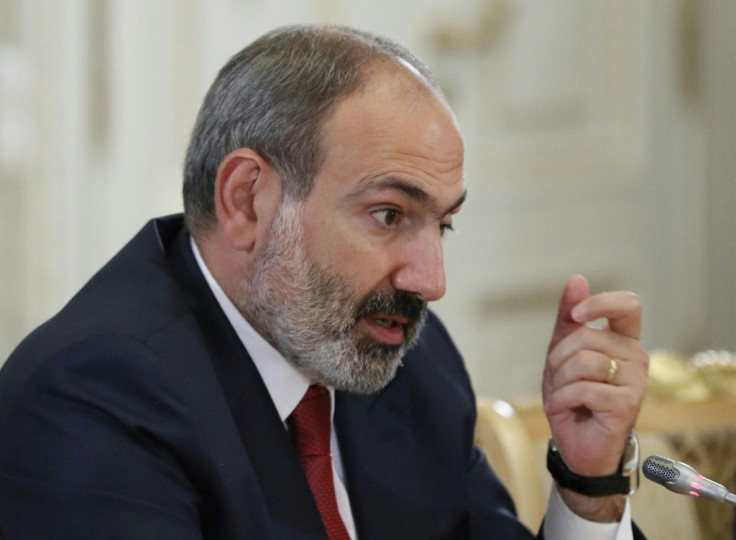Ex-Leader Of Armenia Charged With Embezzlement, But Country Is Reducing Poverty

Former President of Armenia Serge Sarkisian has been charged with embezzlement of state funds by the Armenian Special Investigation Service.
Sarkisian ruled Armenia from 2008 to 2018.
The indictment said while he served as president in 2013, Sarkisian used his position to subsidize petrol imported by a company called Flash LTD at an inflated rate under the guise of a state assistance program for agricultural projects. The difference in amounts was then allegedly pocketed by Sarkisian and his co-conspirators.
The former president, who denied the charges as “fabricated and ludicrous," faces up to eight years in jail if convicted.
Specifically, the Investigation Service said while Sarkisian was aware that other companies made bids at much lower rates, he instructed his cabinet to complete the Flash LTD deal at inflated prices. Then the government approved fuel subsidies for the Ministry of Agriculture, subsequently transferring funds to the corporate account of Flash LTD. The total cost of the deal with Flash LTD amounted to about $2.66 million, paid for by the taxpayer. That figure exceeded the amount offered by an import firm named Maxhur LLC by more than $886,000.
Sarkisian allegedly committed more similar schemes. Sarkisian and other government officials pocketed about $1.02 million in 2013 alone.
Barsegh Beglaryan, the primary stockholder of Flash LTD, is a longtime friend of the former president. Beglaryan continued to receive the bulk of government contracts in 2016 and 2017.
Since Sarkisian was ousted from power last year, he has maintained a low profile. However, one of his brothers, Levon Sarkisian, who is now a fugitive, has been accused of embezzlement and money laundering and is the subject of two arrest warrants. Sarkisian‘s nephew Narek Sarkisian faces charges of illegal arms possession and narcotics trafficking.
The Investigation Service has not formally arrested Sarkisian. Rather, they made him sign a document promising not to leave the country during the ongoing investigation.
Sarkisian’s Republican Party of Armenia characterized the charges as "a brazen manifestation of political persecution."
Sarkisian and his family highlight the corruption that is endemic in a country also beset by poverty.
However, while 23.5% of Armenia's population lived below the poverty line in 2018, the country’s poverty rate has actually fallen from 35.8% in 2010.
That decline has been attributed to economic growth. In 2018, Armenia’s gross domestic product grew by 5.2%, after recording 7.5% growth in 2017.
Armenia has also received economic offers from abroad.
The Asian Development Bank has entered into a 5-year strategy focused on increasing economic diversification in Armenia.
The bank will focus on investments in infrastructure and essential public services, while promoting more regional cooperation and integration.
“Armenia has made strong progress in rebalancing its economy towards more resilient and environmentally sustainable growth in recent years,” said bank country director for Armenia Paolo Spantigati. “Today, as Armenians look forward to a brighter future, our partnership will support the government’s efforts to establish a more resilient economy that is underpinned by fiscal responsibility. By diversifying the economy and investing in human capital, the strategy will help ensure that all citizens reap the benefits of continued growth.”
Rajesh Vasudevan, the bank’s senior economist for Central and West Asia, said that given the importance of the private sector to sustainable economic growth, the bank will promote the participation of private enterprises in infrastructure and social sector projects.
Armenia’s Parliament has just passed a proposal to hike the minimum wage by more than 23%.
“A working person must not live below the minimum consumer basket level,” said Arkady Khachatryan, a parliament deputy from the opposition Bright Armenia Party.
The pay hike, which will be effective Jan. 1, will benefit at least 80,000 workers across the country.
But to overcome poverty in this ancient land the government is looking at longer-term policies.
Prime Minister Nikol Pashinyan asserted the focus should be on education.
“Today we need engineers for two simple reasons,” he said. “Firstly, an engineer will find a job with a high salary in our labor market very quickly. Secondly, that engineer will be able to solve the tasks put by our military-industrial complex, which, as a result, will in turn solve the issue of ensuring the security level of our country.”
© Copyright IBTimes 2025. All rights reserved.





















